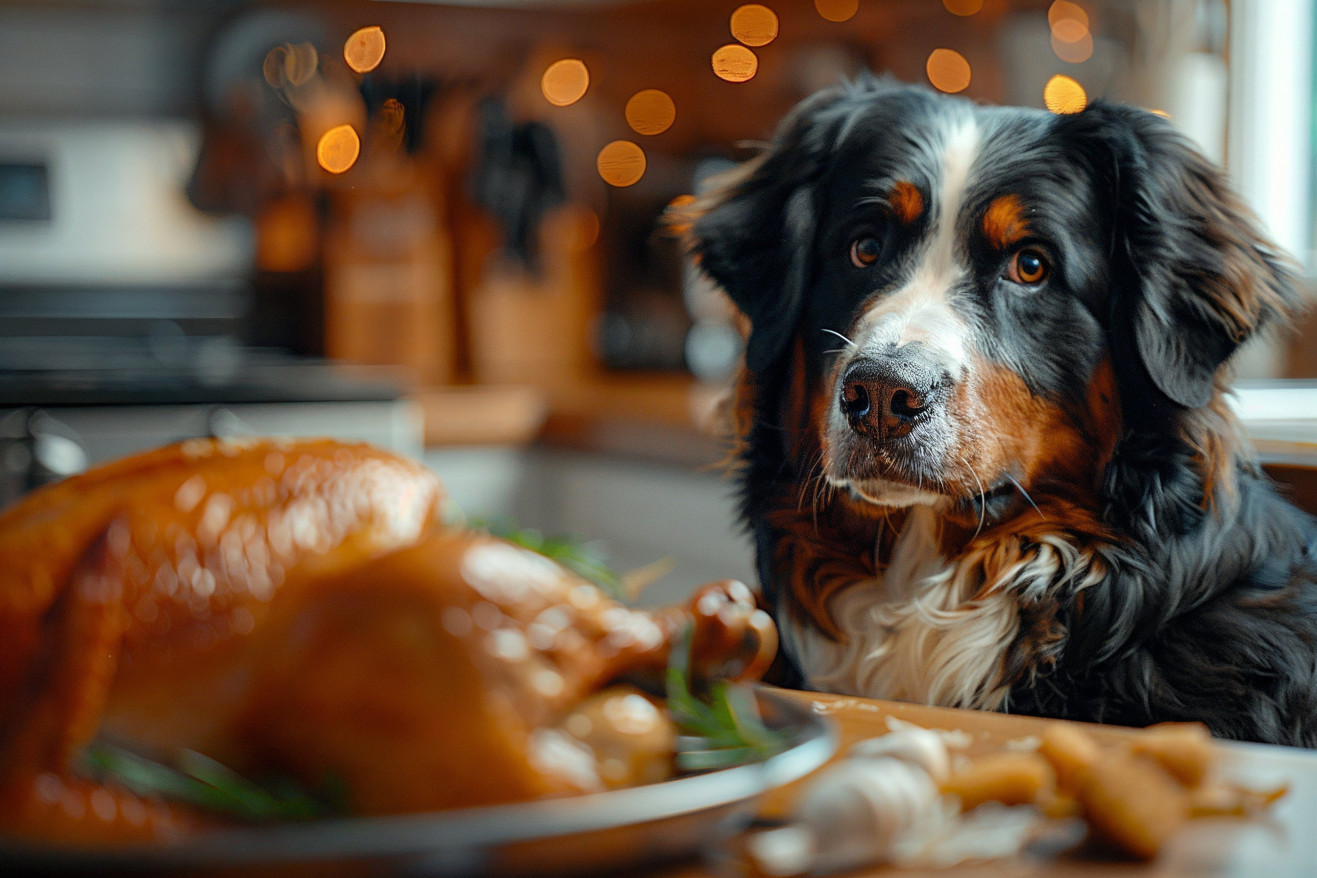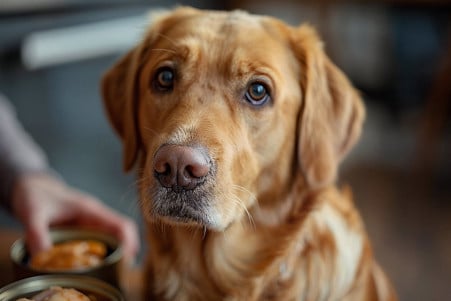Can Dogs Have Rotisserie Chicken? The Good and the Bad
17 April 2024 • Updated 16 April 2024

If you've ever picked up a rotisserie chicken at the grocery store, you've probably felt the urge to share it with your dog. But is rotisserie chicken safe for dogs to eat? While plain, cooked rotisserie chicken is safe for dogs in moderation, the skin and seasoning can lead to digestive issues. It's best to remove any skin, bones, or heavy seasonings before serving your dog a small amount as an occasional treat.
To help you better understand the potential risks and benefits of giving your dog rotisserie chicken, we referenced veterinary nutritionists and animal dieticians to get the lowdown. Their insights will help you learn the best way to add this human food to your dog's diet without causing any negative side effects. By the end, you'll be an expert on what parts of the rotisserie chicken you should and shouldn't share with your dog.
Can dogs eat rotisserie chicken?
Dangers of Dogs Eating Rotisserie Chicken Bones
One of the biggest dangers of dogs eating cooked chicken bones is the risk of internal injury. According to the American Kennel Club, the bones can splinter and cause choking hazards or puncture the digestive tract, which can be extremely painful and life-threatening. Signs of a punctured digestive tract include constipation, lethargy, vomiting, and abdominal bloating.
The Dogster notes that even small, brittle cooked bones can splinter when chewed, causing choking hazards or damage to the esophagus and intestinal tract. If your dog shows any signs of distress after eating chicken bones, it’s important to seek veterinary care immediately. As pointed out by PetMD, bones can cause airway obstruction, gastrointestinal perforation, and bacterial exposure, so it’s important to be on the lookout for these issues.
Of course, the best way to avoid these dangers is to prevent them from happening in the first place. Make sure all food is safely stored where dogs can’t get to it and work on training to prevent counter-surfing and table-surfing. When introducing new foods, such as rotisserie chicken, make sure to supervise your dog so you can quickly address any issues that arise. With these precautions in place, you can help ensure that feeding dogs rotisserie chicken bones doesn’t lead to any dangerous situations.
Risks of Giving Dogs Rotisserie Chicken Skin
The high fat content in chicken skin can lead to digestive problems, including pancreatitis in dogs, says Can Dogs Eat Chicken Skin? Explore The Risks And Benefits. The PetZone blog adds that the skin's seasonings and any other ingredients, such as onion and garlic, can be harmful to animals. Some dog breeds are more susceptible to pancreatitis than others, so it's important to talk to a vet before giving your dog chicken skin.
If you're looking for alternative treats, the PetMD post suggests lean proteins, as well as fruits, vegetables, and grain-free treats. To be safe, make sure to remove the skin from rotisserie chicken before giving it to your dog.
Portion Control: How Much Rotisserie Chicken Is Safe for Dogs?
The daily recommended intake of animal protein for dogs is 1/4 to 1/3 cup per 20 pounds of body weight, per PetMD. Since rotisserie chicken is best served as an occasional treat and not a regular part of your dog’s diet, you should avoid giving your dog large servings of it to prevent potential stomach upset.
As mentioned in the Medium article, it’s best to give your dog rotisserie chicken in moderation and not as a substitute for their regular meals. Pay attention to your dog’s response to the introduction of rotisserie chicken and adjust the serving size as needed. If your dog has an upset stomach after eating rotisserie chicken, discontinue the treat and contact a veterinarian, per the JustAnswer response.
Risks of Overfeeding Rotisserie Chicken
Feeding a dog too much rotisserie chicken can cause pancreatitis and other gastrointestinal problems, according to Heart + Paw. Signs of these issues include vomiting, loss of appetite, abdominal pain, fever, and lethargy. As the JustAnswer response points out, eating too many chicken bones can lead to internal injuries or blockages.
If a dog experiences worrisome symptoms after eating rotisserie chicken, the Pedigreed Database post advises taking the animal to the vet immediately. Meanwhile, the JustAnswer response explains that a vet may suggest a high-fiber, bland diet to help a dog's digestive system recover from overeating.
Can Dogs Eat Leftover Rotisserie Chicken?
Yes, dogs can eat leftover rotisserie chicken. However, there are a few things to keep in mind before you share your chicken dinner with your furry friend.
The biggest thing to be cautious of when feeding your dog leftover rotisserie chicken is the spices and other seasonings that may have been used to prepare the chicken. Many store-bought rotisserie chickens are seasoned with garlic, onion, and other spices that are not safe for dogs, according to PetMD.
To make sure the rotisserie chicken you feed your dog is safe, rinse off as much of the seasoning as possible and remove any visible pieces of skin or fat before giving it to your pet. In addition, the PetZone blog recommends not giving your dog any rotisserie chicken that has been sitting out for a long time or has started to spoil, as this can also be dangerous.
Finally, be sure to watch your dog for any signs of an adverse reaction after eating leftover rotisserie chicken. If your dog shows any signs of digestive upset or other symptoms, stop feeding them the rotisserie chicken and contact your vet, according to the JustAnswer response.
If you take the right precautions, you can give your dog leftover rotisserie chicken as an occasional treat without putting their health at risk.
Conclusion: How to Safely Feed Your Dog Rotisserie Chicken
When prepared correctly, rotisserie chicken can be a healthy and safe occasional snack for your dog. However, it is important to remove the skin, bones, and any visible seasonings from the chicken before feeding it to your dog to minimize the risk of injury. It's also important to feed your dog rotisserie chicken in moderation and not to use it as a replacement for a balanced, formulated dog food diet.
As the JustAnswer response explains, "90% of a dogs food should come from a formulated dog food, and the other 10 percent can come from things such as chicken." The Hot Dog on a Leash article also points out that a diet made up solely of rotisserie chicken is not nutritionally balanced for a dog.
You should also pay attention to your dog's response to the introduction of rotisserie chicken and adjust the amount you feed them as necessary. If you have any questions or concerns about feeding your dog rotisserie chicken, you should consult a veterinarian for advice tailored to your dog's specific needs, as the Medium article suggests.
Pay attention to your dog's response to the introduction of rotisserie chicken and adjust the amount you feed them as necessary. If you have any questions or concerns about feeding your dog rotisserie chicken, you should consult a veterinarian for advice tailored to your dog's specific needs.


